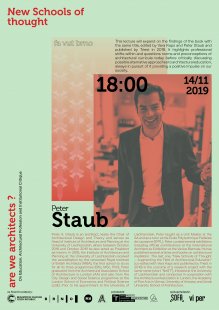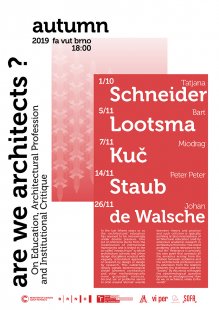
Are we architects? - Peter Staub
New Schools of Thought
The Faculty of Architecture of the Brno University of Technology, in collaboration with the Brno Architecture Gallery and the Student Council of the Faculty of Architecture, invites you to a lecture by architect and educator Peter Staub "New Schools of Thought", which is part of the lecture series "Are We Architects? On Education, the Architectural Profession, and Institutional Critique." The event will take place on Thursday, November 14, 2019, at 6:00 PM in lecture room A310 at the Faculty of Architecture, Poříčí 5, Brno. The lecture will be in English.
NEW SCHOOLS OF THOUGHT
The lecture will build on the insights of the publication of the same name (Triest, 2018), edited by Vera Kaps and Peter Staub. The book emphasizes the transformations of professional discourse, critiques norms and preconceptions reflected in current architecture curricula, and contemplates possible alternative approaches to architectural education, always striving to provide a positive impetus for our society. Peter A. Staub is an architect, professor of design and theory of architecture, and the head of the Institute of Architecture and Planning at the University of Liechtenstein, where he also served as interim president from October 2018 to October 2019. In 2018, the Institute of Architecture and Planning received accreditation from the esteemed Royal Institute of British Architects (RIBA) – as the first school for all three programs (bachelor's, master's, doctoral). Peter graduated from the AA School of Architecture in London and the Urban Design and Social Sciences program at the London School of Economics and Political Science (LSE). In addition to the University of Liechtenstein, he has also worked at the AA and the Swiss Federal Institute of Technology in Lausanne (EPFL). He has curated several exhibitions, including contributing to the International Architecture Exhibition at the Venice Biennale. He has published several articles and books addressing the presentation of architecture. His latest publication is New Schools of Thought – Augmenting the Field of Architectural Education (co-authored with Vera Kaps, published by Triest in 2018), which is the outcome of the eponymous research project (shortly NeST), conducted in collaboration with the University of Liechtenstein, the AA in London, the Academy of Fine Arts in Vienna, the University of Antwerp, and the Umea School of Architecture.
The NeST project focused on exploring new schools of thought and analyzing their concepts to identify trends in architectural education (including education for children and youth, academic education for students, and continuing education for adults). Since the end of the 20th century, architectural training and education have significantly transformed due to changes in legislative regulations, internationalization, social and climate transformation processes, and, last but not least, rapid digitization. Today, architecture schools focus more on how to gain a better strategic position in this environment, i.e., through content, knowledge creation methods, and communication, as well as their organization. Nowadays, they are not merely places where questions and attitudes are discussed. In recent years, new educational institutions have emerged that produce and reflect knowledge, representing this new type of school of thought. In addition to study programs, these institutions also offer preparatory courses for children and youth, research, and public communication as expanded areas of architectural education. The project addresses the conditions that have shaped these “schools of thought.”
ARE WE ARCHITECTS? ON EDUCATION, THE ARCHITECTURAL PROFESSION, AND INSTITUTIONAL CRITIQUE
In the past fifteen years, architectural education has been subjected to a dual pressure. One direction stems from the recalibration of the institutional framework of higher education and is associated with what is sometimes referred to as the “research turn.” The increasing demands and performance in research have been met by architecture and design schools with a vaguely articulated approach called “research by design.” This “evasion” distinctly highlights the epistemological divide between architecture and more methodologically grounded scientific fields that conduct research without qualifiers. Essentially the same problem, but this time coming from the outside, is usually articulated as the problem of theory and practice. This line of criticism often points to the detachment of architectural education from real problems and the applicability of architectural research to real life. The question of relevance is precisely the acupuncture point that connects doubts about the relationship between academia and architectural practice, and doubts about the relevance of the architectural profession for contemporary “Society.” Through this process, an epistemological question about the nature of architectural teaching and research becomes an ontological question: How do we, as architects, relate to the surrounding world, and what role do we want to play in it?
The lecture series "Are We Architects? On Education, the Architectural Profession, and Institutional Critique" is held with the financial support of the Ministry of Culture of the Czech Republic, the statutory city of Brno, and the Czech Architecture Foundation.
More information >
NEW SCHOOLS OF THOUGHT
The lecture will build on the insights of the publication of the same name (Triest, 2018), edited by Vera Kaps and Peter Staub. The book emphasizes the transformations of professional discourse, critiques norms and preconceptions reflected in current architecture curricula, and contemplates possible alternative approaches to architectural education, always striving to provide a positive impetus for our society. Peter A. Staub is an architect, professor of design and theory of architecture, and the head of the Institute of Architecture and Planning at the University of Liechtenstein, where he also served as interim president from October 2018 to October 2019. In 2018, the Institute of Architecture and Planning received accreditation from the esteemed Royal Institute of British Architects (RIBA) – as the first school for all three programs (bachelor's, master's, doctoral). Peter graduated from the AA School of Architecture in London and the Urban Design and Social Sciences program at the London School of Economics and Political Science (LSE). In addition to the University of Liechtenstein, he has also worked at the AA and the Swiss Federal Institute of Technology in Lausanne (EPFL). He has curated several exhibitions, including contributing to the International Architecture Exhibition at the Venice Biennale. He has published several articles and books addressing the presentation of architecture. His latest publication is New Schools of Thought – Augmenting the Field of Architectural Education (co-authored with Vera Kaps, published by Triest in 2018), which is the outcome of the eponymous research project (shortly NeST), conducted in collaboration with the University of Liechtenstein, the AA in London, the Academy of Fine Arts in Vienna, the University of Antwerp, and the Umea School of Architecture.
The NeST project focused on exploring new schools of thought and analyzing their concepts to identify trends in architectural education (including education for children and youth, academic education for students, and continuing education for adults). Since the end of the 20th century, architectural training and education have significantly transformed due to changes in legislative regulations, internationalization, social and climate transformation processes, and, last but not least, rapid digitization. Today, architecture schools focus more on how to gain a better strategic position in this environment, i.e., through content, knowledge creation methods, and communication, as well as their organization. Nowadays, they are not merely places where questions and attitudes are discussed. In recent years, new educational institutions have emerged that produce and reflect knowledge, representing this new type of school of thought. In addition to study programs, these institutions also offer preparatory courses for children and youth, research, and public communication as expanded areas of architectural education. The project addresses the conditions that have shaped these “schools of thought.”
ARE WE ARCHITECTS? ON EDUCATION, THE ARCHITECTURAL PROFESSION, AND INSTITUTIONAL CRITIQUE
In the past fifteen years, architectural education has been subjected to a dual pressure. One direction stems from the recalibration of the institutional framework of higher education and is associated with what is sometimes referred to as the “research turn.” The increasing demands and performance in research have been met by architecture and design schools with a vaguely articulated approach called “research by design.” This “evasion” distinctly highlights the epistemological divide between architecture and more methodologically grounded scientific fields that conduct research without qualifiers. Essentially the same problem, but this time coming from the outside, is usually articulated as the problem of theory and practice. This line of criticism often points to the detachment of architectural education from real problems and the applicability of architectural research to real life. The question of relevance is precisely the acupuncture point that connects doubts about the relationship between academia and architectural practice, and doubts about the relevance of the architectural profession for contemporary “Society.” Through this process, an epistemological question about the nature of architectural teaching and research becomes an ontological question: How do we, as architects, relate to the surrounding world, and what role do we want to play in it?
The lecture series "Are We Architects? On Education, the Architectural Profession, and Institutional Critique" is held with the financial support of the Ministry of Culture of the Czech Republic, the statutory city of Brno, and the Czech Architecture Foundation.
More information >
The English translation is powered by AI tool. Switch to Czech to view the original text source.


0 comments
add comment
Related articles
0
08.12.2019 | Are we architects? - Yanze Wang
0
26.11.2019 | Are we architects? - Johan de Walsche
0
07.11.2019 | Are we architects? - Miodrag Kuč
0
04.11.2019 | Are we architects? - Bart Lootsma
0
26.09.2019 | Are we architects? - Tatjana Schneider
0
16.05.2019 | Are we architects? - Joan Ockman
0
02.05.2019 | Are we architects? - Peter Fattinger
0
16.04.2019 | Are we architects? - Dubravka Sekulić
0
01.04.2019 | Are we architects? - Michelle Howard






